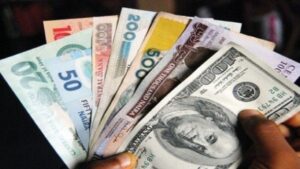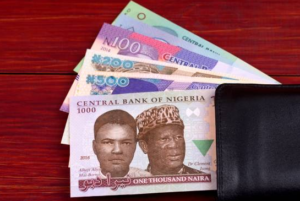The naira depreciated at the parallel market (black market) on Tuesday as the fortune of the currency reversed where a dollar was bought for N785 and sold at N805.
The figure represents a depreciation of N75 from the N710 it traded on Friday morning.
The development is in sharp contrast to the N175 appreciation recorded a week ago when the parallel market exchange rate reduced from N885/$ to N710/$.
Read Also: FG Kicks Against Residents Trading Under Bridges In Lagos

When iBrandtv contacted Bureau De Change operators (BDCs), they claimed that the depreciation is caused by the rising demand for the greenback by customers which worsened demand-supply dynamics.
This is coming at a time when there has been a serious clampdown on the activities of the Bureau De Change operators (BDCs) by the Economic and Financial Crimes Commission EFCC, to tackle inflation by reducing too much money in circulation within the country.
Dollar to Naira Black Market Rate Today
| Dollar to Naira (USD to NGN) | Black Market Exchange Rate Today |
| Buying Rate | 785 |
| Selling Rate | 805 |
Traders said the naira depreciation was a result of the dollar shortage amid rising demand. In Lagos, the dollar traded at between N750 and N770 per dollar, compared to between N700 and N710 traded on Friday at the black market.
In Abuja and Kano, the naira traded at 760-775 per dollar as against 700-710 last week.
“Low inflows of foreign investments into the economy in the face of a challenging business environment will trigger further depreciation in the exchange rate due to pressure on the local currency and raises concerns for the central bank,” analysts at Cowry Asset Management Limited said.
Nigeria’s gross external reserves, which give the Central Bank of Nigeria (CBN) the firepower to defend the naira, lost 8.07 percent or $3.27 billion in over 10 months to settle at $37.25 billion at the start of November from $40.52 billion at the beginning of the year.
The decline, according to the analysts, can be attributed to the reduced inflow of petrodollars into Nigeria’s economy despite the rally in crude oil prices due to the upbeat in oil demand since the Russian invasion of Ukraine in February 2022.
“Despite several initiatives by the Central Bank of Nigeria such as the RT200 program, the increase in interest rates, clamping down on Bureau De Change, and FX repatriation policies, the Naira vis-à-vis the Dollar keeps depreciating,” analysts at FSDH said in a new report.
Read Also: IPMAN Believes Deregulation Will Solve Petrol Scarcity Problem

The report said the recent policy on the issuance of new naira notes has also intensified the currency’s depreciation. While the underlying problem with Nigeria’s exchange rate is limited FX inflows, “we believe that policies by the apex are important tools that influence the movement of the naira.”
The CBN recently announced plans to introduce new banknotes to replace the current N200, N500, and N1,000 notes with effect from December 15, 2022.
At the Investors and Exporters (I&E) forex window, the naira appreciated by 0.08 percent as the dollar was quoted at N445.75 on Friday as against the last close of N446.10 on Thursday, data from the FMDQ indicated.
The naira has fallen by over 5 percent this year to N446.10/USD as of November 10, 2022, from N422.67/USD at the start of the year at the I&E window. In the same vein, Nigeria’s gross official reserves declined by around $866 million to $37.37 billion in October.
Over the years, the CBN has always maintained a culture of intervening in the various foreign exchange markets such as the I&E, and the Secondary Market Intervention Sales windows respectively, following the difficulties experienced in those markets with FX supply.

